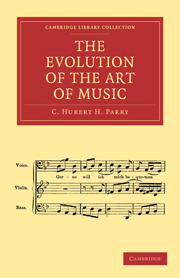Book contents
- Frontmatter
- PREFACE
- Contents
- CHAPTER I PRELIMINARIES
- CHAPTER II SCALES
- CHAPTER III FOLK-MUSIC
- CHAPTER IV INCIPIENT HARMONY
- CHAPTER V THE ERA OF PURE CHORAL MUSIC
- CHAPTER VI THE RISE OF SECULAR MUSIC
- CHAPTER VII COMBINATION OF OLD METHODS AND NEW PRINCIPLES
- CHAPTER VIII CLIMAX OF EARLY INSTRUMENTAL MUSIC
- CHAPTER IX BEGINNINGS OF MODERN INSTRUMENTAL MUSIC
- CHAPTER X THE MIDDLE STAGE OF MODERN OPERA
- CHAPTER XI THE MIDDLE STAGE OF “SONATA” FORM
- CHAPTER XII BALANCE OF EXPRESSION AND DESIGN
- CHAPTER XIII MODERN TENDENCIES
- CHAPTER XIV MODERN PHASES OF OPERA
- SUMMARY AND CONCLUSION
- INDEX
CHAPTER VIII - CLIMAX OF EARLY INSTRUMENTAL MUSIC
Published online by Cambridge University Press: 29 August 2010
- Frontmatter
- PREFACE
- Contents
- CHAPTER I PRELIMINARIES
- CHAPTER II SCALES
- CHAPTER III FOLK-MUSIC
- CHAPTER IV INCIPIENT HARMONY
- CHAPTER V THE ERA OF PURE CHORAL MUSIC
- CHAPTER VI THE RISE OF SECULAR MUSIC
- CHAPTER VII COMBINATION OF OLD METHODS AND NEW PRINCIPLES
- CHAPTER VIII CLIMAX OF EARLY INSTRUMENTAL MUSIC
- CHAPTER IX BEGINNINGS OF MODERN INSTRUMENTAL MUSIC
- CHAPTER X THE MIDDLE STAGE OF MODERN OPERA
- CHAPTER XI THE MIDDLE STAGE OF “SONATA” FORM
- CHAPTER XII BALANCE OF EXPRESSION AND DESIGN
- CHAPTER XIII MODERN TENDENCIES
- CHAPTER XIV MODERN PHASES OF OPERA
- SUMMARY AND CONCLUSION
- INDEX
Summary
Although the principles of design upon which modern self-dependent instrumental music is based had hardly dawned upon the minds of men till the eighteenth century was nearly half spent, the latest instrumental music of the early period, written almost entirely upon the same general principles as choral music, is not only historically important, but has more genuine vitality than a very large proportion of the music which has come into existence since the cultivation of pure harmonic music has so greatly enlarged the resources of composers. The situation is parallel in many respects to the earlier crisis of Palestrina and Marenzio. There is less of the sense of immaturity in their work than in the work of Lulli and Scarlatti of nearly a century later; and there is far less of immaturity in the instrumental works of Bach and Handel and their fellows than in the works of Galuppi or Paradisi, or even in the early works of Haydn. Maturity is a relative term altogether. If a man's ideas are worth expressing, and are capable of being expressed completely within the limits of his resources, his productions may be in a certain sense completely mature at almost any epoch in the progress of artistic development. If Palestrina had introduced discords more freely and treated them with less reserve, and had aimed generally at a stronger type of expression, the balance of his work would have been destroyed; he would have gone beyond the limits which were then inevitable for completely artistic work.
- Type
- Chapter
- Information
- The Evolution of the Art of Music , pp. 175 - 192Publisher: Cambridge University PressPrint publication year: 2009First published in: 1896



